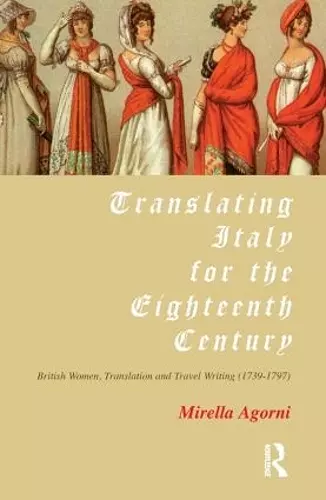Translating Italy for the Eighteenth Century
British Women, Translation and Travel Writing (1739-1797)
Format:Paperback
Publisher:St Jerome Publishing
Published:1st Sep '02
Currently unavailable, our supplier has not provided us a restock date
This paperback is available in another edition too:
- Hardback£145.00(9781138178403)

Translating Italy in the Eighteenth Century offers a historical analysis of the role played by translation in that complex redefinition of women's writing that was taking place in Britain in the second half of the eighteenth century. It investigates the ways in which women writers managed to appropriate images of Italy and adapt them to their own purposes in a period which covers the 'moral turn' in women's writing in the 1740s and foreshadows the Romantic interest in Italy at the end of the century.
A brief survey of translations produced by women in the period 1730-1799 provides an overview of the genres favoured by women translators, such as the moral novel, sentimental play and a type of conduct literature of a distinctively 'proto-feminist' character. Elizabeth Carter's translation of Francesco Algarotti's II Newtonianesimo per le Dame (1739) is one of the best examples of the latter kind of texts. A close reading of the English translation indicates a 'proto-feminist' exploitation of the myth of Italian women's cultural prestige.
Another genre increasingly accessible to women, namely travel writing, confirms this female interest in Italy. Female travellers who visited Italy in the second half of the century, such as Hester Piozzi, observed the state of women's education through the lenses provided by Carter. Piozzi's image of Italy, a paradoxical mixture of imagination and realistic observation, became a powerful symbolic source, which enabled the fictional image of a modern, relatively egalitarian British society to take shape.
'By shifting attention away from the well-worn costume drama of British-French rivalry in the eighteenth century, Agorni not only proposes a more nuanced view of the elaboration of British national identity in that century but she also makes explicit connections between travelling texts (translation) and textual travellers (travel writing) which add to our understanding of the relation between mobility, sensibility and gender in earlier periods.'
Michael Cronin, Studies in Travel Writing
ISBN: 9781900650533
Dimensions: unknown
Weight: 170g
178 pages